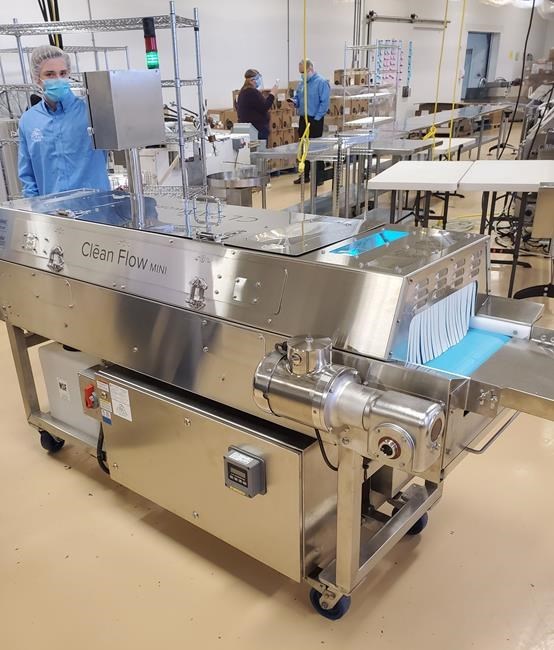Mark VanderVeen and his team at Clean Works were determined to work at all hours, even over Easter weekend, to get their sanitization equipment out to front-line workers.
VanderVeen, the president and CEO of Clean Works, has been in constant communication with officials from the National Research Council and Health Canada the past two weeks to make sure that the Clean Flow Healthcare Mini would be approved to sanitize N95 masks.
The Clean Flow uses technology originally developed to sanitize produce, but was approved by Health Canada last week to be sent to health-care facilities so they can start reusing the N95s, a critical piece of personal protection equipment for people who may be exposed to COVID-19.
"These guys at the NRC and Health Canada, they worked the past two weeks, I would say 24/7, with us to validate and ensure that the technology provides the health-care workers with the solutions that they need," said VanderVeen on Monday.
"It was quite an extensive walk that we did but, again, it was to get a solution out there to health care providers."
The 2.4-metre long stainless steel device — modelled off of a barbecue but similar in looks to a tanning bed — can sanitize 800 masks in an hour.
Clean Works, based in Beamsville, Ont., will deliver its first units to hospital health networks across Canada, including Hamilton Health Sciences and the Nova Scotia Health Authority, sometime this week. Orders for the units have also been placed by Niagara Health Region, Toronto EMS and National Research Council in Ottawa.
"You can move it from boardroom to boardroom, if that's what's required, or from floor to floor in hospitals and institutions," said VanderVeen. "It's not a big, bulky machine of any sort. It's very portable. That's the way that we designed it."
The Clean Flow is based on a waterless process developed by Prof. Keith Warriner, who studies food sciences at the University of Guelph. It combines ultraviolet light, hydrogen peroxide and ozone to make compounds that kill pathogens, including the novel coronavirus.
Warriner had been approached in 2015 by Paul Moyer, owner of Moyer's Apple Products and co-founder of Clean Works, because he was worried about the listeria outbreak in candy apples at the time. Warriner had been investigating waterless cleaning systems since 2005, and with Moyer he focused on the problem of sanitizing candy apples without melting or damaging the caramel coating.
When the federal and provincial governments put out a call to private businesses to help with the COVID-19 pandemic, Warriner was inspired. He and post-doctorate researcher Mahdiyeh Hasani modified the clean-flow process to handle masks instead of produce.
"It's ideal, isn't it?" said Warriner. "It's a gentle process. It's waterless, it's effective and it's very quick."
Warriner says that getting Health Canada's approval for a process like the Clean Flow could normally take months but given the urgent need for the device, it was pushed through. Testing didn't just focus on making sure it could eradicate COVID-19, but also that the masks wouldn't be damaged or deteriorate during the process.
Clean Works used to produce one of the Clean Flow units per week, but is now stepping up its manufacturing process to pump out more to meet the demand.
This report by The Canadian Press was first published April 20, 2020.
John Chidley-Hill, The Canadian Press




